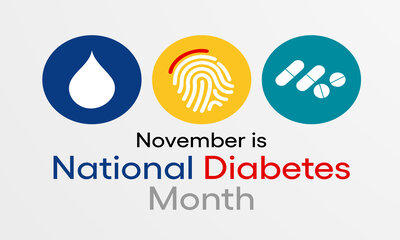
Picture of an Ad that has three emoji icons of a blood drop, finger print, and prescription bills. Ad says:
November is National Diabetes Month
National Diabetes Month
Even though 30 million people in the U.S. have some form of diabetes, one in four don't even realize they're walking around with the disease. National Diabetes Month is a way each November to boost awareness about the risk factors, symptoms, and types of diabetes. If you've been recently diagnosed with either Type 1 or Type 2, or if you are considered pre-diabetic, here is some helpful information.Two Types of Diabetes
Type 1 diabetes occurs when the body can't provide insulin, a hormone in the pancreas that breaks down carbohydrates into blood sugar or glucose, for energy. Insulin therapy helps the pancreas to function normally. Many children suffer from Type 1 diabetes although it can affect people of any age or background. Type 2 diabetes is the most common form of the disease where the body is unable to process our internal insulin well enough to keep blood sugar at normal levels.
Know Your Risks
You may be predisposed to Type 2 diabetes if you are overweight, older than 45, your parent had Type 2 diabetes, you exercise very little, and you have been diagnosed with prediabetes. Losing weight is a key preventive measure. With a 10-14-pound weight loss, you can improve your chances of avoiding or even beating diabetes. Try to exercise about 30 minutes a day, five times per week.
TIPS
Take small steps.
Making changes to your lifestyle and daily habits can be hard, but you don't have to change everything at once. It is okay to start small. Remember that setbacks are normal and do not mean you have failed--the key is to get back on track as soon as you can.
Move more.
Limit time spent sitting and try to get at least 30 minutes of physical activity, 5 days a week. Start slowly by breaking it up throughout the day.
Choose healthier foods and drinks most of the time.
Pick foods that are high in fiber and low in fat and sugar. Build a plate that includes a balance of vegetables, protein, and carbohydrates. Drink water instead of sweetened drinks.
Lose weight, track it, and keep it off.
You may be able to prevent or delay diabetes by losing 5 to 7 percent of your starting weight.
Seek support.
It is possible to reverse prediabetes. Making a plan, tracking your progress, and getting support from your healthcare professional and loved ones can help you make the necessary lifestyle changes.
Stay up to date on vaccinations.
The COVID-19 (booster shot, if eligible) and flu vaccines are especially important for people who may be more likely to get very sick from COVID-19 or the flu, such as people with diabetes.
If you are a newly diagnosed diabetic, or were diagnosed years ago, and need help keeping your numbers under control, Sabetha Community Hospital can help you. They offer Diabetes Education with Lori Menold, RN, and Dietary Counseling with Ann Wassenberg. To make an appointment with Lori or Ann, call (785) 284-1552. An Endocrinologist, Kelli Bradbury, also comes monthly. To make an appointment with Kelli, call (785) 368-0445.
